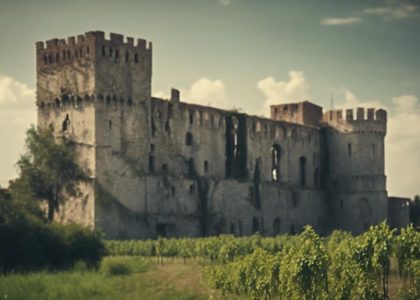The intricate tapestry of Pisan elite society throughout history unveils a nuanced portrait of power, privilege, and prestige. From the early origins of noble lineages to their ascendancy in shaping the political landscape, the elite families of Pisa wielded influence far beyond their numbers. As we navigate through the corridors of patronage and cultural contributions, a deeper understanding emerges of the complexities that underpinned their societal standing. However, as with any tale of grandeur, there also exists the inevitable shadow of decline that looms over the once-mighty aristocracy of Pisa, leaving us to ponder the forces that precipitated its fall from grace.
Early Origins of Pisan Nobility

The origins of Pisan nobility can be traced back to the early medieval period, revealing the foundational roots of elite society within Pisa. As Pisa developed into a prominent maritime power in the Mediterranean, noble families emerged as influential figures in the city-state. These noble families played crucial roles in shaping the political, economic, and social landscape of Pisa, often aligning their interests with the expansion and prosperity of the city.
During this period, Pisan nobility distinguished themselves through their leadership in trade, governance, and military endeavors. Their wealth and status afforded them privileges and responsibilities that set them apart from the common populace. Through strategic alliances and marriages, these noble families solidified their positions within Pisan society, further consolidating their power and influence.
The early origins of Pisan nobility laid the groundwork for the rise of elite families that would dominate the political scene in Pisa for centuries to come. Understanding the roots of Pisan nobility provides valuable insights into the dynamics of elite society and the interconnected relationships that shaped the city's history.
Rise of Noble Families in Pisa

Exploring the emergence of influential lineage in Pisa sheds light on the ascension of noble families within the city's societal framework. As Pisa flourished economically and politically, certain families rose to prominence, consolidating power and influence. These noble families secured their status through strategic marriages, successful business ventures, and active participation in civic affairs. Below is a table showcasing three notable noble families in Pisa during this period:
| Noble Family | Notable Members | Contributions |
|---|---|---|
| House of Conti | – Alberto Conti | – Prominent in maritime trade |
| – Lucia Conti | – Known for patronage of the arts | |
| House of Della | – Giovanni Della | – Strong military leadership |
| Gherardesca | – Caterina Gherardesca | – Influential in political negotiations with other city-states |
These families played a pivotal role in shaping Pisa's social hierarchy and cultural landscape, leaving a lasting legacy that resonates to this day.
Influence of Pisan Nobility in Politics

As Pisa's noble families solidified their positions through strategic alliances and economic prowess, their influence in political circles became increasingly pronounced. The nobility played a crucial role in shaping the political landscape of Pisa, leveraging their wealth and connections to wield power and influence over key decision-making processes. Here are three key ways in which the Pisan nobility exerted their influence in politics:
- Control of Government Positions: Noble families often secured prominent positions within the Pisan government, allowing them to directly participate in policymaking and governance. These positions granted them the ability to shape laws and regulations in a manner that aligned with their interests and agenda.
- Alliances with Foreign Powers: Pisan nobles cultivated alliances with powerful foreign entities to strengthen their political standing and expand their influence beyond the city-state. These alliances not only provided military support but also opened up opportunities for economic growth and territorial expansion.
- Influence in Diplomatic Affairs: The nobility actively engaged in diplomatic affairs, representing Pisa in negotiations with other city-states and foreign powers. Their diplomatic acumen and networks enabled them to secure favorable treaties and agreements that advanced Pisa's political objectives while safeguarding their own interests.
Patronage and Cultural Contributions

Through their substantial financial support and promotion of artistic endeavors, the Pisan elite significantly influenced the cultural landscape of their society. Patronage played a crucial role in shaping Pisan culture, with the elite class investing in various artistic projects, such as the construction of magnificent cathedrals, lavish palaces, and elaborate sculptures. These cultural contributions not only showcased the wealth and power of the Pisan elite but also enriched the artistic heritage of the region.
Moreover, the patronage of the Pisan elite extended to supporting renowned artists, architects, and scholars, fostering a vibrant intellectual and creative environment. Artists like Bonanno Pisano and Giorgio Vasari flourished under the patronage of the elite, producing masterpieces that continue to be celebrated today. The Pisan elite's support of cultural endeavors not only elevated the status of artists and intellectuals but also contributed to the flourishing cultural scene of Pisa during that period.
Decline of Pisan Aristocracy

The decline of the Pisan aristocracy marked a significant turning point in the history of Pisa's elite society. This shift was characterized by various factors that contributed to the diminishing influence and power of the noble families in the region:
- Economic Challenges: The aristocracy faced economic hardships due to changes in trade patterns and the declining profitability of traditional industries, leading to a loss of wealth and influence.
- Political Instability: Internal power struggles and external conflicts eroded the political stability that the aristocracy had relied upon, weakening their ability to maintain control and authority.
- Social Change: The emergence of new social classes and ideologies challenged the established hierarchy, causing tensions and diminishing the prestige associated with aristocratic status.
As the once dominant aristocracy grappled with these challenges, their decline not only reshaped the power dynamics within Pisan society but also paved the way for a new era characterized by evolving social structures and values.





